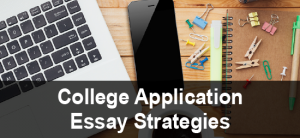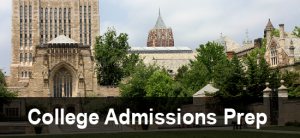Can reading the books on your school’s summer reading list make a difference in terms of the college admissions process?
Yes and no.
Let’s be clear. Just reading these books isn’t going to give you an edge.
However, there are strategies you can use to transform your summer reading into a meaningful intellectual experience that also helps you distinguish yourself in your college applications.
Before sharing these strategies, I want to introduce you to a mindset technique that strengthens your ability to think creatively whenever you hear about what matters to college admissions officers, what’s happening at other schools, or what other students are doing.
Focus on the surface level of the details. Those details are important. But don’t limit yourself to them.
Think about how you can adapt these things to your own situation and whether or not doing so would be appropriate for you.
WHAT’S THE ACADEMIC VALUE OF SUMMER READING LISTS?
Turning your required summer reading into something other than yet another item on your to-do list requires understanding why such reading is valuable.
Few schools provide you with insight into the intellectual value of the work that you’re assigned. You’re just told to do things, and your focus is on digesting the content and remembering it.
However, it’s also essential to get “behind” the work in order to develop a sense of the underlying skills it’s helping you cultivate and think about how the project is designed to stimulate the growth of these skills.
Why?
This approach helps you learn how to learn, which is one of the most important skills.
Let’s take a look at the summer reading project The Hotchkiss School requires of its rising seniors and consider it in relation to the issues I just mentioned.
Students are told to. . . .
“Discuss the ways in which The Things They Carried, The Hunger Games, and `A Work of Artifice’ reflect the tension between human nature and societal constraints. Some additional questions you may ask yourself might include: How do these works echo, contrast, or inform each other? What are the limits of an individual’s responsibility to a society? What does it mean to be a creative follower?”
You’ll immediately notice that the reading list isn’t very comprehensive.
Students just have to read O’Brien’s novel, watch a movie, and read Marge Piercy’s relatively short poem. They are also required “to read three additional titles” of their choice.
Hotchkiss teachers from a wide variety of departments (e.g., Classical Languages, the Deans Office, English, History, Humanities, Human Development, Mathematics, Modern Languages, Physics, and Visual and Performing Arts) offer a few of their favorite reads along with a brief synopsis of what they find compelling about their picks. Click here if you want to check out their suggestions.
What is intellectually stimulating about Hotchkiss’ approach to summer reading?
Students are exploring multiple genres, strengthening their ability to discover underlying and perhaps surprising connections between three very different works of art, and contemplating how these works address larger, more universal themes.
Reading a long list of books can be amazing, but oftentimes it keeps your knowledge broad and superficial.
Hotchkiss gives students the opportunity to narrow down their focus in order to go deep, something that you often can’t do during the school year when you have to cover far more material.
WHY SHOULD YOU CARE ABOUT HOTCHKISS
IF YOU DON’T GO THERE?
Here’s where you should be using that mindset technique I mentioned earlier.
I’ll help you apply it.
If your school gives you a simple list of books, I want you to find a way to make your required reading more meaningful and intellectually stimulating by adapting Hotchkiss’s approach to your own list.
For instance, you might want to challenge yourself to figure out the theme of the works that you’re reading. This sounds so simplistic, but a lot of high schools—even top-ranked public and private schools—have students focus mainly on summarization, not high-level analysis. It’s important to understand what happens in a book, but that’s a very basic level of knowledge. Discerning the themes of literary works is a more advanced skill that often doesn’t get taught in high school but is an essential part of preparing to do the kind of interpretation that’s expected of you in college.
Watch “How to Figure Out Themes in The Great Gatsby,” a video I created, which teaches you how to determine the difference between the subject of a work and its theme and then guides you through the process of detecting at least one of the themes in Fitzgerald’s masterpiece.
WHAT DOES THE ACADEMIC VALUE OF SUMMER READING LISTS HAVE TO DO WITH COLLEGE ADMISSIONS?
College admissions officers are looking for students who have an unquenchable curiosity, who are passionate about learning, and who take the initiative to challenge themselves intellectually.
You’ve probably heard that hundreds of times, and you’ve probably thought about it in relation to taking the most academically challenging classes and getting involved in extracurricular activities that will allow you to pursue your interests.
But if you’re applying to Ivy League schools, top liberal arts colleges, and other great schools, you’re going to be competing against hundreds—if not thousands—of other students who have taken the same course of action, so if you’ve done well in these areas, you’ll be academically “viable,” but this isn’t what’s going to make you stand out in the admissions process.
One way to stand out is to demonstrate your ability to transform even simple assignments like a summer reading project into a intellectual adventure.
Here are some tips on how to bring about this kind of transformation and how you can use it in the college admissions process.
HOW TO MAKE YOUR SUMMER READING MATTER IN THE COLLEGE ADMISSIONS PROCESS
TIP #1: If you have a transformational experience through your summer reading project, you can write about it in your Common Application essay.
Let’s say you were required to read Pearl S. Buck’s The Good Earth, which sparked your interest in representations of Chinese culture in 20th-century American literature and inspired you to work on an independent project related to it.
In this case, you might want to write your application essay on how your required reading influenced the direction of your studies. Or if you were initially dreading having to read the book and then had this whole new world open up for you, you could write about your initial failure to keep an open mind. Or maybe this experience “marked your transition from childhood to adulthood” because you realized that you no longer waited for others—teachers or parents—to direct your learning. You started taking charge of shaping your learning.
Just FYI, required summer reading does not belong on your Common Application activities list. However, if you create your own summer reading and research project, you can include it as part of your list.
TIP #2: Do more than just read the books.
You might want to come up with an angle on summer reading lists or a particular book and pitch an article to TeenInk or even your local newspaper. Maybe you’ve become intrigued by the author and want to prepare something to submit to the Letters About Literature contest.
In order for your projects to make a difference in the college admissions process, you’ll need to figure out where in your application to share details about them. You could include them in the Common App list of activities and even in the Additional Information section.
TIP #3: Help make the summer reading project more meaningful for your school, your fellow students, and yourself.
You could transform what was once a simple reading assignment into a form of school service by doing something like creating a Facebook group for students at your school to discuss what you’re reading, ask each other questions, and perhaps also interact with some teachers.
You could transform the summer reading project into a leadership experience. For instance, if a lot of students are complaining about the book choices and wanting more of a say in their selection, you might want to consider meeting with school officials and inquiring about the possibility of creating a student advisory board.
Use these ideas as a springboard for coming up with your own action plans.
Click here if you want me to help you maximize your summer reading and transform it into something that could give you a competitive edge in the college admissions process.
Blog post image used: ©pixelrain/bigstock.com



